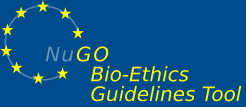- Home
- NuGO Guidelines
-
Definitions
-
Examples
-
Background
-
This is a static version of the NuGO Bioethics Guidelines Tool from 2007. Some links may be outdated. Searching is disabled. Please contact the authors for comments or questions
NuGO Guideline 8
Biobanks
Ownership and governance
Agreements on the ownership of the samples and associated data should be established prior to biobanking and should be subject to multiparty contracts. Usually the institution is the owner of the biobank and the scientist/principle investigator (PI) in charge of the biobank is the curator. As such he or she has to take all appropriate steps to protect the samples and data, its storage, use and access. All steps should be guarded by an independent data protection officer. The data protection officer must be appointed specifically by the institution and is responsible for ensuring compliance with the legal requirements applicable to the handling, sharing, or pooling of personal data.
The use of biobank samples and data by a third party should be subject to a research contract involving a consortium agreement. The contract should also cover the issue of patenting rights in case intellectual property arises out of the biobank use by the third party (see Guideline 16).
There is one comment on this page:
A tissue sample constitutes inanimate matter under § 90 BGB (German Civil Code), owing to the lack of intention to reintroduce it into the donor's body.
According to § 953 BGB (parts of subjects), a tissue sample is the property of the donor, unless other agreements have been made.
Any transfer of ownership of a tissue sample to a biobank requires a legally binding agreement between the biobank and the donor.
That body material has been left behind at a GP or a clinic does NOT imply the donor's willingness to give up their property rights ("dereliction") in analogy to § 959 BGB.
- If the sample is used for further medical treatment, intentional abandonment can be excluded.
- Dereliction requires an intention to relinquish property rights, which can be assumed to be lacking because of ignorance.
- A doctor is obliged (§ 667 BGB) to return everything to the patient that they have received for the purpose of treatment of the patient.
According to §§ 903, 929 BGB, a biobank can transfer the property rights of a sample to a third party as long as the biobank is the legal owner of the sample.
- This entitlement is only limited by the common (and indispensable) personal rights of the donor.
An anonymized sample can be transferred to a third party without any limitations.
- In analogy to § 40 BDSG, however, its use must be limited to any purposes spelled out in the donor's consent.
A pseudonymized sample is subject to the same legal regulations as the associated personal and clinical data.
[ Comment by Prof. Dr. Michael Krawczak, www.tmf-ev.de, 2007-09-17 12:00:00 ]
